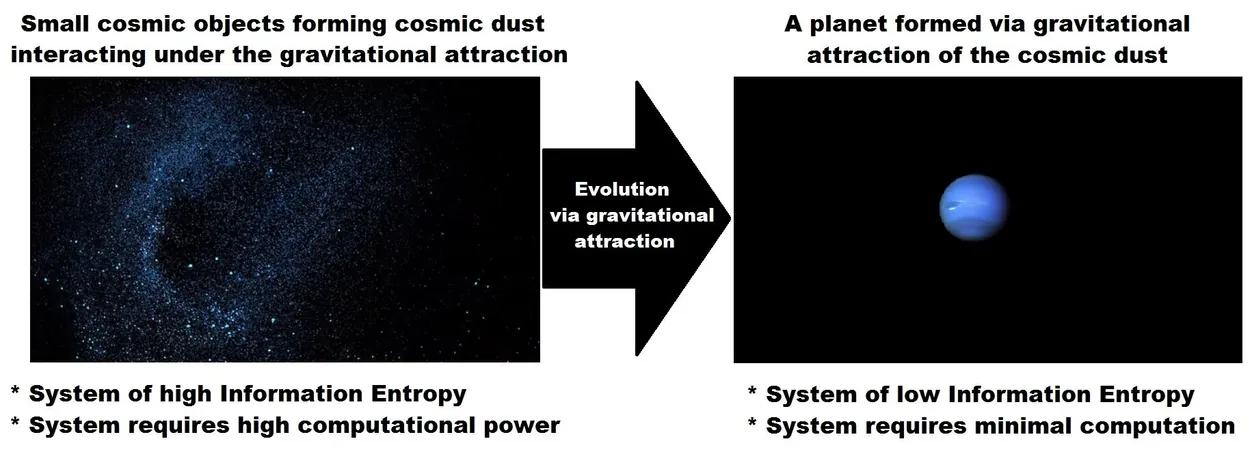
Is Our Universe the Ultimate Computer? Explore This Mind-Blowing Theory!
2025-04-25
Author: John Tan
Are We Living in a Virtual Reality?
Imagine if our entire universe were just an elaborate computer simulation! This captivating theory has sparked intense debate, challenging our understanding of reality and existence itself.
The Theory That’s Capturing Minds
One of the most talked-about ideas suggests that our universe is fundamentally informational, akin to a sophisticated computational process. High-profile figures like Elon Musk have endorsed this theory, attracting even more attention to the field of information physics. This branch of science posits that what we perceive as physical reality is essentially a structured stream of information.
Dr. Vopson's Revolutionary Findings
In a groundbreaking paper featured in AIP Advances, Dr. Melvin Vopson from the University of Portsmouth lays out a compelling argument that gravity itself may result from a computational framework embedded within the universe. He proposes a fascinating idea: what if gravity is merely a consequence of how the universe organizes information about matter?
Gravity: More Than Just a Pull?
Dr. Vopson's research indicates that matter in the cosmos is compelled to come together to maintain a neat and efficient information structure. He notes, "My findings suggest that the universe may operate like an enormous computer, where gravity—rather than being simply a force—is a way for the universe to keep itself organized." This radical vision reshapes our understanding of gravity from a common force into an optimization process.
Information: The New Building Block?
Continuing his innovative exploration, Dr. Vopson previously proposed that information possesses mass. He argues that elementary particles—our universe’s building blocks—store vital information about themselves, much like DNA in living cells.
The Pixelated Universe Explained
Delving deeper, Dr. Vopson illustrates how elementary cells could act as a data storage medium. Each cell records information in binary form: a digital "0" indicates emptiness, while a "1" signifies the presence of matter. This mirrors how video games or virtual reality systems are designed, showcasing the universe’s possible computational paradigms.
A Paradigm Shift in Understanding Gravity
As cells can hold multiple particles, the universe effectively 'joins' these particles into larger entities, triggering a force of attraction. This phenomenon arises because the computational system aspires to minimize information—essentially optimizing its efficiency. Dr. Vopson asserts that it’s computationally easier to track a single object than many, illustrating how gravitational attraction could be an elegant optimization mechanism at play.
Rethinking our Cosmic Perception
These revelations challenge conventional views on gravity and suggest it may be intrinsically linked to a cosmic drive for order and efficiency in processing information. This new perspective emphasizes gravity not merely as an attraction but as a vital element of a grander, self-organizing cosmic algorithm.


 Brasil (PT)
Brasil (PT)
 Canada (EN)
Canada (EN)
 Chile (ES)
Chile (ES)
 Česko (CS)
Česko (CS)
 대한민국 (KO)
대한민국 (KO)
 España (ES)
España (ES)
 France (FR)
France (FR)
 Hong Kong (EN)
Hong Kong (EN)
 Italia (IT)
Italia (IT)
 日本 (JA)
日本 (JA)
 Magyarország (HU)
Magyarország (HU)
 Norge (NO)
Norge (NO)
 Polska (PL)
Polska (PL)
 Schweiz (DE)
Schweiz (DE)
 Singapore (EN)
Singapore (EN)
 Sverige (SV)
Sverige (SV)
 Suomi (FI)
Suomi (FI)
 Türkiye (TR)
Türkiye (TR)
 الإمارات العربية المتحدة (AR)
الإمارات العربية المتحدة (AR)